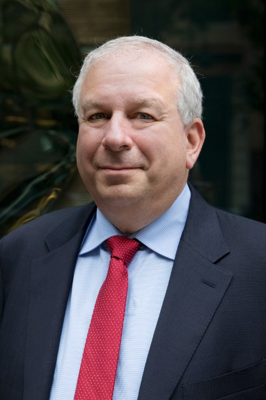Transcripts

Erik: Joining me now is David Rosenberg, founder of Rosenberg Research and author of the legendary Breakfast With Dave newsletter. Dave, it's great to get you back. Obviously, the question on everybody's mind is the bottom in? Is it just a bear market rally? Where are we headed from here?
David: Well, I think that we've had a few bear market rallies this year. Not unlike the bear market rallies that we had through a good chunk of 2001 and 2002. And back in 2008, we had some of the most powerful bear market rallies. And these are bounces that are fun to trade. If you think you are Paul Tudor Jones, then go right ahead and trade them. Each one of these has actually failed at or close to the 200-day moving average. So if you're watching the technicals, you can trade the market in a bear market. Trade it from the long side for a period of weeks or months and you can do rather well, so long as you have your exit strategy and your hedges in place. But yes, of course, this has been a another bear market rally. And I say that because if we're willing to acknowledge that we were heading into recession. You see, this is a case where your assumptions end up drawing your conclusions. If your conclusion is that we're going to have a soft landing, that we're going to have slower growth but no recession, then the lows have been put in and you want to buy this market on any dip. That's not my view. My view was that we're heading into a recession. It wasn't the first half of this year with the back to back quarters of negative growth. That was the pernicious impact of the shock from food and from energy. But the real enchilada is going to come next year is we get the full brunt of all the lags of what the Fed has already done. And so the one thing I know about history, and I think one of the best quotes of all time came from Warren Buffett, when he famously said that what we know from history is that people don't learn from history. But we know that, although there's not an alarm bell that goes off right at the market low. We do know that there are patterns that constantly reemerge in a recessionary bear market very close to the trough. And I'll just give you two of them to start off. The first is that in a recessionary bear market, the market bottoms 70%. You know, call it the seventh inning of the recession. The market bottoms, as the recession becomes more commonplace, more priced in. And at that point at the lows, what the market is doing is pricing in the ensuing recovery. So I just say good grief to anybody who thinks there's going to be a recession but is buying the market thing that it's hit a trough is a classic case of cognitive dissonance. Because if we have a recession, it's only now just starting, or we'll start in the opening months of next year. And you want to buy the market deep into the recession. We're not there yet.
Second point is tied to the first point, which is that you want to buy the market and I mean, dive in for the next cycle, not a bear market rally, not a tradable rally but a new cyclical bull market. They happen when the Fed has cut interest rates sufficiently to re-steepen the yield curve. The yield curve right now and I'm looking at the 2s-10s curve, but every curve is inverted right now. 2s-10s are inverted by almost 80 basis points. There has never been in history a period where the market bottomed as the Fed was still raising rates into an inverted yield curve. It just doesn't happen. If you want to trade the market or become an investor saying it's going to be different this time. You know, it reminds me of Harry Callaway, you know, in the famous Dirty Howard films from Clint Eastwood saying do you feel lucky punk? The reality is that the market bottoms for good not just 70% into the recession, but 70% into the Fed easing cycle. Well, this Fed is still tightening and raising rates into an inverted yield curve. Historically, when we get those lows in the stock market, again in the context of a recessionary bear market, which I think we are heading into. The 2s-10s curve has steepened to a positive shape of 140 basis points. Now, I'll tell you we will we will get there. It's a matter of, really of when. And it might not be until we're well into the second half of next year because this Fed doesn't look like it's set to turn anytime soon. But you need the yield curve, to shift out of inversion towards a positive slope in the context of a Fed easing cycle. Remember, they say don't fight the Fed. Well, for people that think that the markets bottomed, I asked the question, why are you fighting the Fed? Didn't pay to fight the Fed when they were cutting rates and easing policy through most of 2020 and 2021. But all of a sudden, we're supposed to believe that a bottom in the market is at hand as the Fed is still raising interest rates into an inverted yield curve, it boggles the mind. But it goes to show how desperate everybody is to have this bear market end. But the sad reality, and this is a case again, where my grandmother told me as a young lad, forewarned is forearmed. We have yet to see the lows and we could be down at least another 20 or 30% from where we are today before we get to those lows. And that probably will not happen given the Feds posturing until we're deep into the second half of next year.

Erik: Joining me now is Dr. Pippa Malmgren, independent economist, best selling author, and author of Pippa's Pen and Podcast. Absolutely outstanding content on the podcast. Pippa I have to tell you, I always knew that you were a super smart woman. It wasn't until recently that I really started reading your blog, that I've come to understand the breadth of your knowledge of so many things. So congratulations on your new blog and listeners. That's at drpippa.substack.com. Welcome back, Pippa.
Pippa: It is great to be here! Thank you.
Erik: I want to dive right in. You were the second person after Mike Green to tell me that World War Three had already begun. I interviewed Mike Green and got his update on that last week. I really want to come back to this because something that happened for me when I had that conversation with you and also with Mike, is I was conflating World War Three to mean that you and Mike were predicting a certain nuclear Armageddon that was coming any day. That's not what you meant. So let's start with what did you mean more precisely, then? And how is the story evolved from then to now?
Pippa: Yeah, well exactly. So I wrote a piece, I put out my launch piece for purpose pen and podcast on October 29 last year, and I argued World War Three is already started. But the thing is, World War Three doesn't need to be like World War One and World War Two. World War One, it was humans fighting hand combat in trenches, machine guns. World War Two is about airpower. World war three, I believe, started in space. So kind of the ultimate altitude airpower, and we had a lot of incidents between particularly the Russians, the Chinese, and the Americans. A lot of attacks on satellites and, you know, blowing up your own satellite to create a debris field that would knock the other guy's satellites out of the orbits. And I think that the view was the superpowers could face off up there. And, look, there are no journalists. And there's nobody to talk about it, because anybody who's involved is under an NDA and classified information is involved. So I understood, there's something going on that's really big. And I saw it was starting to spill over into more hostile relations between the superpowers in other domains. And then I felt just people needed to be forewarned that the temperature level is rising to the point that we're going to have real live incidents. And then the next thing I knew on January 6, which is when I date, the beginning of the earth based elements of this war that we're now in, which was on a tiny little island in the Arctic Circle, is part of Norway, it's called Svalbard. And it has the fastest internet connection in the world. And people were like, well, why does it have that? Well, because virtually every commercial and military satellite plus the International Space Station connect to Earth at Svalbard. So there was this fascinating incident, which appears in retrospect that one of the Russian oligarchs took their massive yacht and placed it over the top of that cable, and submarines went underneath and cut it. And they didn't just cut it in one spot, they cut it in two, and took away like six and a half kilometers of cable, so nobody could say it was like an accident. And it was meant to send a signal. And the British Chief of the Defense Forces came out and said, under normal circumstances, this would be considered an act of war. And so it put NATO on high alert. That was, you know, what, the 6 to 8 weeks before the tanks rolled into Ukraine.
So that was what I meant is that we're beginning a process of confrontation, which is not just what we're looking at most of the time, which is Ukraine, and in fact, the many, many other physical locations involved. And if I update it to today. There are more countries now involved in this superpower confrontation, then there were in World War Two. The good news is that the standoff is happening mainly through technology rather than through humans fighting each other. Of course, in Ukraine, there's been a terrible loss of life. So that's the one exception, but there's been all kinds of other stuff going on, you know, internet cable cuts and sabotage. And then, ultimately, what's really been happening in recent weeks, in my opinion, is we have indeed, gotten very, very close to an actual nuclear event. And that's been reflected by the way, I'm not, you know, so far out there. The head of the UN said we're hair's breadth away from a nuclear event. We've had many leaders refer to this near Cuban Missile Crisis. And I think that is exactly what is happened. And it explains a lot about how things are unfolding now. So why is it that all of a sudden out of the blue, the chief of the British defense forces jumped on a plane and ran to Washington completely unscheduled, and unexpected? Why is it that all of a sudden the US has agreed to direct nuclear negotiations with Russia nothing to do with Ukraine. Just to talk about nuclear and I think it's going to include weapons of mass destruction. Why is it President Xi has suddenly been like hey truce and negotiations are a good idea. I think it's because the Russians got a lot closer than anybody realized they were going to get to actually doing something with a nuclear weapon. And for a while everybody thought well President Putin might want to do that, but his military won't execute it for him, they'll find excuses. It'll just not happen. But as soon as reported in the press, there started to be indications that his military was aligned with him on that. And I think that scared everybody. And we've ended up exactly where you'd expect, which is, you get a real threat of a nuclear weapon and suddenly, everyone agrees to go back to the negotiating table.

Erik: Joining me now is Mike Green, chief strategist and portfolio manager for Simplify Asset Management. Mike, it's great to get you on the show. I want to dive right in because it was boy, next month, I think or in January, it will have been two years since you first told me off the air in a private phone call that World War Three had begun a year prior to that. And at the time, I have to admit, I was completely dismissive. I thought you were off your rocker. But in hindsight, what I recognize is, the reason I wasn't listening as I should have been, is the phrase World War Three, to me really equated to certain and impending imminent nuclear Armageddon. And I thought you were crazy to think that. That's not really what you thought that's not what you meant. So let's start by clarifying what did you mean, when you told me almost two years ago now that a major new war cycle had begun?
Mike: Well, first of all, thank you for having me back. And your initial assessment that perhaps I'm off my rocker was the right one. But what I meant by World War Three was effectively we were moving into a regime in which, the frenemy coopetition dynamic between China and the United States in particular, had degenerated and had really begun to generate starting in 2013, into a next phase of competition, where we were really focused on effectively carving up the rest of the world into spheres of influence. And that we were going to engage in a series of competitive trading dynamics, competitive financial market manipulation dynamics, and proxy wars, that could under bad circumstances escalate out of the cold war type framework that we were familiar in the Soviet Union, and potentially turn hot.
Now unfortunately, I think that as time has passed, things have gotten hotter. And the question now is, can we avoid an escalation? That takes it much further, but it does, I think most people would acknowledge, as you kind of have, that we've begun to very clearly move into a competitive mode that often involves degrees of violence, that feels very different than the coopetition that we were engaged in for the better part of 30 years following the fall of the Soviet Union.

Erik: Joining me now is Rory Johnston, founder of commoditycontexts.com. Rory has been an oil analyst in Canada for many years. Rory, it's great to have you on MacroVoices as a first time guest. Thanks for joining us.
Rory: Thanks for having me, Erik.
Erik: I want to start by asking you to critique my thesis or my bold call, if you will, which our regular listeners are already familiar with. Which is I contend that the world is unable to return to pre-pandemic normal in terms of the overall global economy, for the simple reason that we don't have enough energy supply. And my argument is, it was proven actually in 2021 before there was any Russian invasion. If you look at the explosion of time spreads, that happened in 2021, we had an incredibly, incredibly tight physical market. And that was before any discussion of China coming back online. My contention is that once China does come back online, we're going to have more demand than we can ramp supply up to meet, and it's going to create a global energy crisis. Please tell me why I've got that wrong, because you know the physical market very, very well. And I'm dying to have somebody sent me straight if I've got this wrong.
Rory: I will say, I don't think you have the kind of broad contours wrong. I think that I share the view that over the next at least half decade, the supply demand balance looks tremendously bullish for all the reasons that you mentioned. We're still decently below pre-pandemic production levels, and demand is there as well. And as you mentioned, with China one day, eventually coming back to full production, you know, we're still down somewhere in the ballpark of 2 million barrels a day under where peak Chinese consumption was prior to the COVID zero lock downs. So, I think that will definitely have a tremendously kind of price positive and bullish effect. I think the challenge is that we're still I would contend very new into this, you know, latest regime of the oil market. If you can think about the last regime, kind of starting around 2014, when you had that massive buildup of shale production growing at any price level, cratered prices, the new the new normal for, you know, as far as anyone was looking forward was in that kind of $40 to $60, shale band range. And that lasted, basically from 2014 right up until 2020 and I think a lot of people expected it to last longer. And a lot of the things that people said were inevitably kind of flawed or couldn't continue about shale really that point got punctuated and fast forwarded by the pandemic shock. But I think now, a lot of the reasons that we're still talking about the US shale can't produce faster, for instance, I think as well, we're still in a relatively new period of US shale producers finding this cashflow positive kind of religion. And I think it's still too early to say if that's going to be a permanent feature.
I think the other thing that's important here is that when people think about US shale growing slowly. I think they think about it actually growing slowly, and it's still going to grow faster than any other producing jurisdiction on the planet. It's just probably going to grow at somewhere in the ballpark of half the speed that it was growing prior to the pandemic. And I think, just for context, you know in 2018 when Brent prices were around $60 bucks a barrel on average for the year. US shale or us total liquids production growth grew by something like 2 million barrels a day or more than the entirety of global demand during that period. That was an insurmountable wave of supply that the market could never work through in a way that, you got three digit oil prices, but now it's going to grow more in the ballpark of 500,000 to a million barrels a day, which I think is both a more sustainably kind of healthy pace of growth for the global oil market. But I think it's also still extraordinarily fast relative to what most other jurisdictions historically have ever seen. So, I think that would be my point is that I'm less certain whether or not this will be the permanent new normal, or if this is just another phase. And after a period of high prices, and after some of these supply chain bottlenecks in the US begin to unwind, we couldn't begin to see some of that appetite for growth at any cost again. I think it's, the oil market is cyclical, psychology is cyclical, and I and I'm not yet convinced that this is the final end of history chapter of US shale.

Erik: Joining me now is Eric Peters, Founder and Chief Investment Officer for One River Asset Management and One River Digital. Eric, it's great to have you back. It's been way too long. You know, I really enjoy reading your weekend notes email that I get every single Saturday. I particularly was interested in a comment that you made saying that the strongest or best I think the way you phrased it was the best armed military powers in the world are suddenly at odds with each other or in direct conflict. Tell us a little bit more about how you see this geopolitical situation. What's driving it and what it means for markets?
Eric Peters: Sure. Erik, great to be back. It's, it has been a while actually. And boy a lot a lot happen in the world. It feels like we have new things to talk about every time we get together. So yeah, what I referenced was, it seems apparent that we are. We're in a period of rising conflict and it's becoming more explicit. So this past week, I was referring specifically to the Russians claiming that the UK Ministry of Defense or defense ministry had been intervening in the drone attack on the Black Sea Fleet. And then I think what really caught my eye as well, is that we had the last week we had a Senate report that came out that actually said it was I don't know the exact terms, but reasonably likely that COVID came from a lab. And you know, that comes after a couple of years of strong statements in opposition to that theory. And I think that, you know, there are plenty people who looked at the original COVID leak and had observed that there was at least a reasonable probability or possibility that it come from a lab. And, you know yet I think, probably for political reasons, the government pushed back hard on that. So it's just interesting that that all of a sudden, it seems to be the opposite is true.
MACRO VOICES is presented for informational and entertainment purposes only. The information presented in MACRO VOICES should NOT be construed as investment advice. Always consult a licensed investment professional before making important investment decisions. The opinions expressed on MACRO VOICES are those of the participants. MACRO VOICES, its producers, and hosts Erik Townsend and Patrick Ceresna shall NOT be liable for losses resulting from investment decisions based on information or viewpoints presented on MACRO VOICES.
